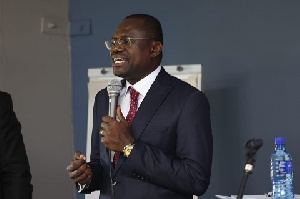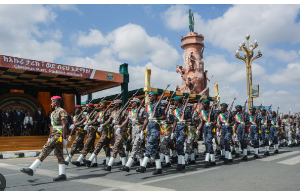Bole (N/R), July 4, GNA - Mrs Hannah Tetteh, Minister of Trade and Industry, on behalf of Vice President John Mahamah on Saturday launched a 52 million-Ghana Cedis National Mango Plantation Project aimed at developing mango orchards in a five-year period.
The Project, which is private-sector-led and sponsored by the Export Development and Investment Fund (EDIF), is targeting the cultivation of about 8,100 hectares in Northern; Upper East; Upper West; Brong Ahafo and the Northern parts of the Volta Regions.
The project is to produce about 300,000 tonnes of mangoes worth about 37 million Ghana Cedis annually when completed. Mr Mahama said the project would provide opportunities to the beneficiary communities and urged the people to use it to turn their economic fortunes around. He said the Government would not relent in assisting farmers to improve upon their productivity, adding Government would facilitate the development of non-traditional export crops such as dawada and add value to them before exporting them.
He said the Government would not neglect other sectors of the economy because of the discovery of oil, explaining that agricultural productivity would be sustained to promote industrial growth. Mr Kwesi Ahwoi, Minister of Food and Agriculture (MOFA), said in a speech read on his behalf, that the Ministry was implementing an Export Marketing and Quality Awareness Project (EMQAP) with the aim of developing the value chain of certain crops including mango.
He said under the Project, shed nine of the Tema Harbour has been refurbished as a fruit terminal while sea pack houses are also being constructed to enhance quality of exportable fruits in partnership with the Federation of Association of Ghanaian Exporters. He said due to the intervention of EMQAP and other stakeholders it was estimated that mango exports went up from less than 500 tonnes to more than 1,000 tonnes between 2006 and 2008.
He expressed the hope that with the support from EDIF, farmers would increase production tenfold by 2015.
Mr Ahwoi said the intervention of EDIF over the years had created jobs for 200 exporters and improved the incomes of 300 farmers' groups and has earned foreign exchange for the country.
The Agriculture Minister said one of the main challenges facing the Mango Project was the indiscriminate felling of trees of commercial value such as dawada and the sheatree and, therefore, stressed the need for the integration of agro-forestry and cropping systems of farming without excessively cutting down of important trees. He also warned that bushfires and animal browsing threatened the survival of the mango trees during the dry season and urged the district assemblies and the youth to create the necessary awareness and to develop strategies to address the challenges. Mr Moses Bukari Magbenba, Northern Regional Minister said it was estimated that the mango project in the Region would produce about 24,000 tonnes of mangoes for processing locally. This he said is expected to increase by 89,000 tonnes when the project is fully operational.
The revenue returns from the local processing activity Mr Magbenba said was programmed to yield about eight million Ghana Cedis annually, adding that the local component was expected to form the basis for the local agro-industrialisation of Ghana. He said the Project would revolve around pushing lead farmers as nucleus farmers to pull along out-growers such as farmer-based organisations to facilitate the transformation of subsistence hand to mouth existence into export led competitive farming. He said each nucleus farmer would be cultivating about 20 hectares of mangoes with 75 farm families in adjoining communities cultivating about an hectares each on contiguous lands to form a block farm. 4 July 10
General News of Sunday, 4 July 2010
Source: GNA












